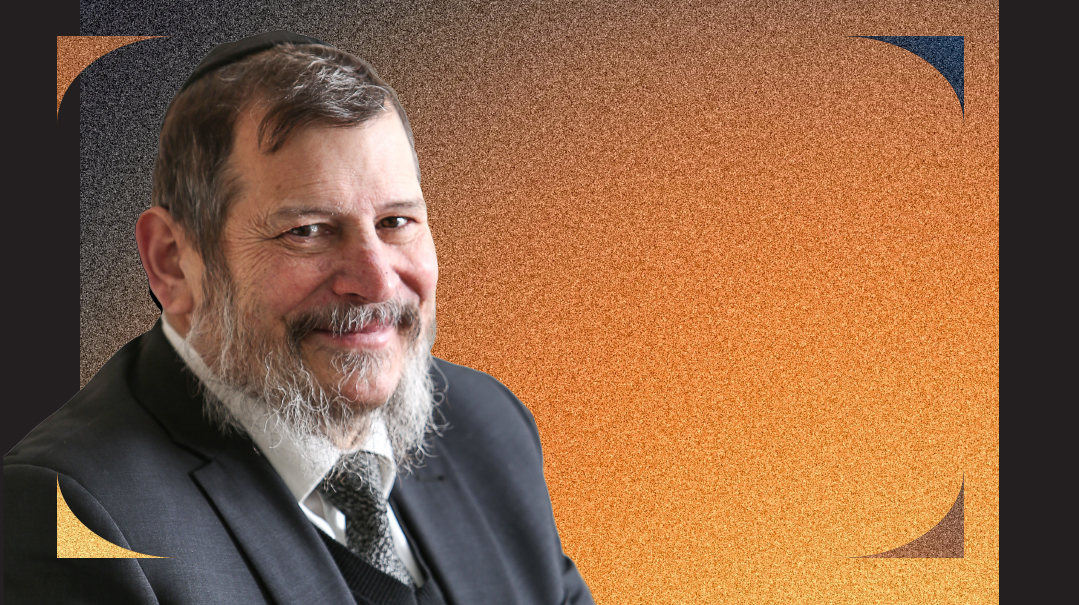He Paved the Final Path
| September 13, 2022Yankie Meyer eased the final journey for countless Jews — and never forgot the families they left behind
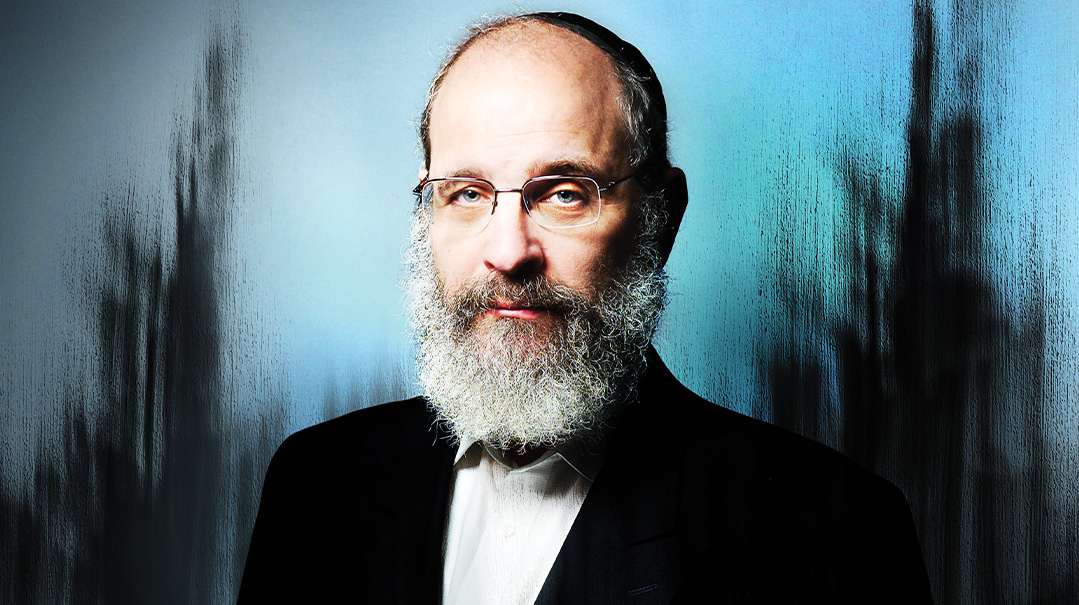
Photos: Naftoli Goldgrab, Hatzalah Museum
Yankie Meyer didn’t just organize chairs for shivah houses. While Misaskim, his brainchild, dives into action whenever a Jewish neshamah departs from This World, the list of initiatives was endless for this one-man chesed machine who, with discretion and dignity, was the consummate advocate for the needs of every Yid, in both life and on their final journey
Even as a young kid,
Yankie Meyer — young, energetic, and in a perpetual rush — was always eager to help out a fellow Yid. But he never forgot a lesson he learned when someone close to the family passed away, and there were many arrangements that had to be made.
“I came home from yeshivah, heard the tragic news, and immediately hurried over to the house of mourning to offer help,” he told Mishpacha in a wide-ranging interview a few years back. “I ran all the way there, then ran up six flights of stairs and entered the apartment breathlessly, with a splash. My father was standing there, and he looked up at me. ‘Nisht azoi kimt men arein tzi a niftar — that is not how one enters a house of mourning,’ with such haste, energy, and liveliness instead of with poise, dignity, and levelheadedness. He sent me back home.”
If the thousands of shocked, broken Yidden who attended Yankie Meyer’s levayah in Boro Park last Friday could tell his father one thing, it would be, “Yankie learned how to do it.”
While Yankie Meyer, who passed away last week at 58 after a ravaging illness, was the founder and director of Misaskim, just trying to list the other organizations and activities that kept him perpetually busy is an exercise in futility, because his reassuring presence could be found practically everywhere there was a need in Klal Yisrael.
For decades, he was Hatzalah’s “B-41”; he served as a chaplain in multiple law enforcement agencies, including the New York City and the Port Authority police departments, New Jersey Transit Police, the Office of the New York Medical Examiner, and the Sullivan County Sheriff’s Office; and he was even a weekly Tomchei Shabbos volunteer… and the list goes on for this man who was the consummate advocate for the needs of Klal Yisrael at all hours of the day or night. Yankie’s huge heart and impeccable organizational skills combined to make him the ultimate public servant, a one-man chesed machine trusted by all, who not only cared for all Yidden during their lives, but also on their final journey.
The many reflections and stories that have been and will be written about Reb Yankie Meyer won’t do him justice, though, because how can mere words adequately describe all that this unstoppable individual accomplished in his lifetime?
“He utilized every tool in his toolbox, and he had so many of them,” says NYPD Lieutenant Yitzy Jablon. “He had a heart the size of the world, and no matter how sensitive the story, he was the go-between who knew what to say and how to say it to make everyone feel more comfortable.”
There was one constant to every call that Jablon got from Yankie over the 20 years that the two knew each other.
“He never asked for a favor for himself,” recalls Jablon. “It was always about someone else. But he made it sound like he was calling about a family member, even if it was probably someone he never even knew. Every Yid who walked this earth was part of Klal Yisrael, and that was his family.”
When a mother and three children died in a 2017 Chanukah fire in Brooklyn, Yankie stepped up as he always did, coordinating efforts between the police, the fire department, and the press as the night unfolded. As the bodies were removed from the house, Jablon watched Yankie line up a row of people, creating a human wall that kept the niftarim far away from prying eyes and camera lenses, in order to ensure their dignity.
“He was a master, always thinking ahead,” notes Jablon. “He was the bridge and the glue that kept things together. You name it, he was there — any catastrophe that happened, he was the guy who was there coordinating and easing the pain as much as humanly possible.”
That same compassion extended beyond the Jewish community as well. When NYPD Chief Charles Scholl died this past June of health complications, Yankie was the first one to arrive at the scene, driving to Scholl’s Red Hook home to lend support to the family. When Misaskim was called to Sunset Park in 2013 after the gruesome murder of an Oriental woman and several children, Yankie sent teams to the site for the cleanup, knowing that his volunteers would make a kiddush Hashem.
“He had a heart of gold that yearned to do good for others,” says Mishpacha’s North America CEO Avi Lazar. With Mishpacha’s US offices located next door to Misaskim’s for 13 years, Lazar got a glimpse into Yankie’s empire of chesed. “How many times was his conference room ground zero to meet with New York city and state big brass to discuss safety for Yidden, including the really big events such as the Siyum HaShas? He was one of the most connected people I knew, but he never bragged, and it was never about self-interest. Those relationships were cultivated to further Klal Yisrael’s needs, never his own.”
Lazar relates how Yankie would occasionally pop into the Mishpacha office to ask him to join a trip to the beis olam to bury a meis mitzvah because he needed another man for the minyan.
Yankie’s efforts went on with little fanfare — he was all about getting the job done and had no problem rolling up his sleeves, as Jablon discovered during a post-levayah conversation with Rabbi Nate Segal of Staten Island who told him about a story that had taken place some 15 years ago.
“He said to me, ‘You think you know Yankie Meyer?’ ” says Jablon. “Yankie Meyer is the guy at 3 a.m. in Staten Island, where there are no cameras and no one taking video, and he’s down on the floor, cleaning up a body, a meis mitzvah, and nobody knows about it but me.”
Yankie never sat back and waited for a tense situation to play itself out if there was something he could do to resolve it. Years back, when there were tensions in Bay Ridge between the Muslim and Jewish communities, Yankie initiated a meeting between both groups and resolved the situation. He also worked closely with Muslim groups in 2018 when the New York City Department of Health announced the launch of an electronic system to register births and deaths, which had the potential to delay burials. Misaskim and Muslim Funeral Services protested the move, their joint effort resulting in numerous changes to the planned rollout in order to accommodate the needs of both communities.
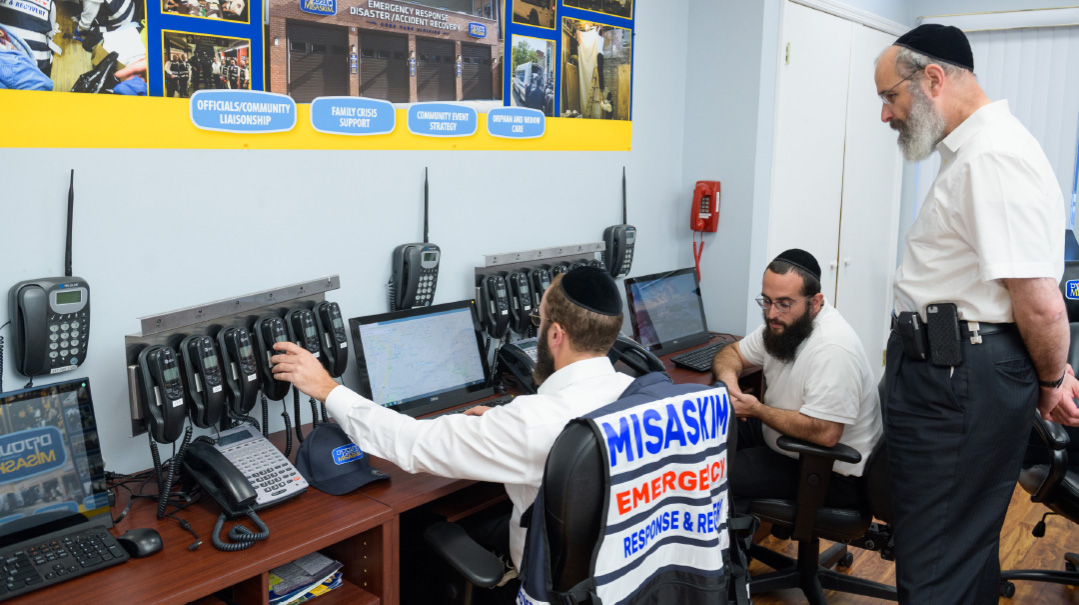
Misaskim was Yankie Meyer’s brainchild, but it went way beyond shivah support. “No matter how sensitive the story, Yankie was the go-between who knew what to say and how to say it”
F
or many of us, September 11, 2001, was life-altering. And so it was for Yankie Meyer.
As a longtime Hatzalah member, Meyer knew he had to be at the scene on that fateful Tuesday morning 21 years ago, with the breaking news that the World Trade Center had been hit by a passenger airliner.
As he was racing toward Lower Manhattan, still unaware of the magnitude of the catastrophe, he saw the second plane fly straight into the South Tower. When he arrived — the towers not yet imploded — he stood by helplessly with other rescue personnel watching as people were jumping out of the buildings. Suddenly, the world around him was covered with a cloud of twisted metal and black choking soot. Making a human chain, he and other emergency personnel were able to cut through a building across the street, but as the second tower began to come down, he couldn’t outrun the cloud of ash that was closing in on him — until the hand of a nearby building superintendent reached out and dragged him into the relative safety of a basement, gave him a working cell phone so he could call his wife, and then brought him over to a sink with running water. It took close to an hour to cough out all the soot from his lungs.
But once he could breathe again, emergency services had to move into high gear with no time to waste. At first, the nearby Manhattan Community College campus was set up as an emergency room, and Yankie sped off to Brooklyn in a police car to load up a truck with medical supplies. He wound up staying on the scene until Shabbos, sleeping in his car and coming home just once to shower off all the soot and ash. For months afterward, Yankie was summoned back to the rubble in the middle of the night because, living as he did just six miles away, he was one of the closest chaplains to Ground Zero.
“Bodies and human remains were being found for months afterward, and there was never a body removed without a chaplain present,” he told Mishpacha. “You suited up and went down into the pit and didn’t know what you were going to find. We just kept going back and forth. There were many halachic questions that came up, and we tried different ways of finding information, like verifying that someone was in the building by checking if his ID had been swiped, so his wife wouldn’t remain an agunah. We escorted bodies to the medical examiner’s office and cemented relationships we already had.”
Misaskim didn’t yet exist, but when it was established four years later, those connections made all the difference.
Boro Park born and bred, Yankie Meyer attended Yeshiva Karlin-Stolin as a teenager, then moved on to a small local yeshivah called Ohel Yaakov, learned in Mir and Beth Medrash Govoha, and after his marriage to Gittel Glancz, joined Hatzalah and opened up Paper Masters, a printing company that he continued to run amid all his “volunteer” work.
Going out on Hatzalah calls at all times of day and night, Yankie saw firsthand that death brought with it a long list of arrangements that needed to be coordinated, something that wasn’t being taken care of in any formal way. The number of requests that Yankie received for assistance continued to grow, until it became clear that a central number for people to call was needed for help setting up a shivah house, expediting burial, or dealing with various agencies. Misaskim was officially founded in 2005 under the auspices of Rav Yechezkel Roth ztz”l, the Karlsburg dayan, who served as the agency’s rabbinical authority. Its legendary chair gemach debuted at the shivah for Rebbetzin Zahava Braunstein a”h.
“We came in, and people were blown away,” Yankie recalled. “Misaskim became a runaway train in the Tristate area because there was such a need.”
It might have started with chairs for shivah houses, but soon people began calling when they needed help with a levayah. Misaskim has buried hundreds of mesei mitzvah, often preventing cremation by picking up the tab to ensure that families agree to a halachic burial.
And how many times did Meyer stand outside the doors of the exit ramp waiting for family members to come off the airplane to give them tragic news about a loved one, or knocked on the door of a home to deliver a besurah he knew would change their life forever?
Misaskim has been involved in the legislative process on several occasions, including a successful effort several years ago to change a law giving mortuary schools the right to demand bodies for dissection if they remained unclaimed at the medical examiner’s office after 48 hours. Misaskim’s involvement in that law became what Yankie Meyer dubbed “the refuah before the makah” in the story that continued to haunt him for life: the Sassoon fire.
It was March 20, 2015, just hours before the heartbreaking Friday night blaze that claimed the lives of the seven Sassoon children, that State Senate Bill S3340 addressing unclaimed bodies was first introduced on the Senate floor by Senator Simcha Felder. Because the medical examiner’s office had been working with Meyer to bring the bill to the floor and amend the law, everyone in the medical examiner’s office felt a sense of camaraderie with Meyer and were happy to expedite the Sassoon burials, despite being wakened in the middle of the night.
In a 2019 interview with Mishpacha, more than four years after the devastating fire, Meyer told me how he still got emotional recalling the horrific scene with niftarim in four different hospitals.
“I’ve unfortunately been around many times when a child passes away, and these weren’t the first children who passed away in a fire, but it was the first time I was in a room where a child died and there was not a single family member in the room to turn to,” Meyer said.
It was only after everything had been arranged with the medical examiners that they realized there was another daughter in the burn center in Staten Island with no one to look after her. Meyer woke up another hospital liaison, and the police drove them to the hospital to make sure she was getting proper care until family members could be there.
He was called into the 70th Precinct on Shabbos morning when the children’s father, who had been away for the weekend, was located. Shaking his head, Meyer — a man who typically remained unruffled by the worst of the worst — paused for a long moment before sharing how he broke the incomprehensible news to Gavriel Sassoon.
“He was screaming and held on to me so tight I thought he would choke me,” Meyer said. “All of a sudden he stopped and said, ‘It’s Shabbos today. I’m not allowed to cry.’ ”
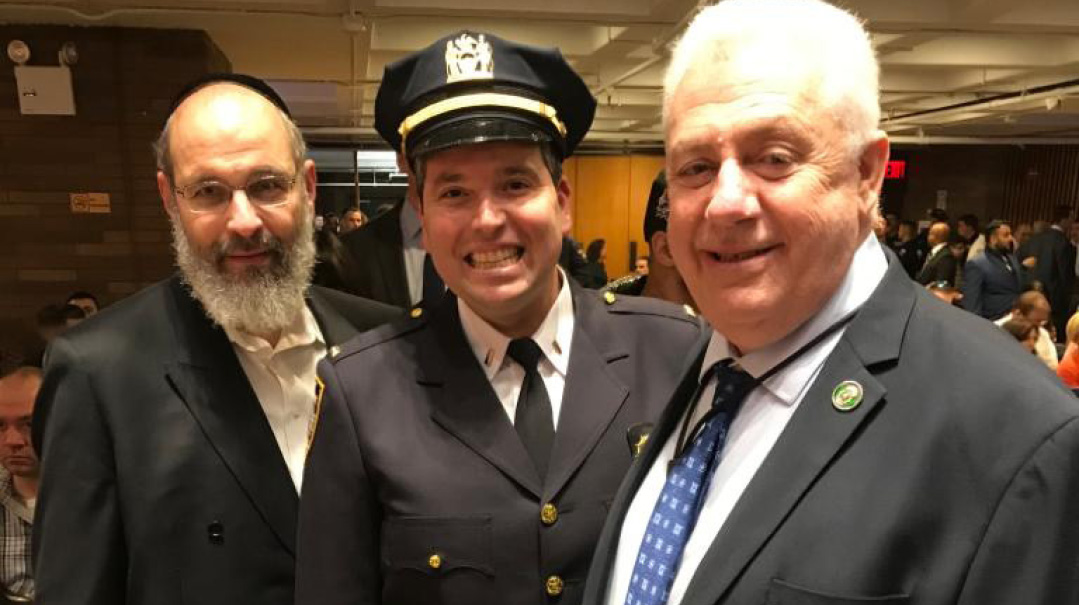
Yanky with Lieutenant Yitzy Jablon and his predecessor, the former commanding officer of community affairs for Brooklyn South. “He never asked a favor for himself. It was always about someone else”
L
ongtime community activist Michael Fragin, deputy mayor of the Village of Lawrence and a storied Jewish liaison for Republican candidates going back a quarter century, first met Yankie Meyer when he was working as an executive assistant to Governor George Pataki. The two attended various meetings regarding inevitable issues of concern to the Jewish community that popped up, and even now, years later, Fragin recalls being amazed at how Yankie had clearly taken the time to get to know members of law enforcement, as well as their families and their children.
“He cared about every single person he interacted with, cared about their thoughts and what they were doing,” says Fragin. “It was something remarkable about him that no matter who it was, he gave them respect that was deserved or maybe even undeserved. It was never about him, and everybody knew it, and I think that is what made him so incredibly effective.”
Yankie Meyer reached out to Fragin in 2020 after a Pesach that had seen members of the Jewish community dying in record numbers at the start of the pandemic. The Jewish cemeteries in Suffolk County — particularly Wellwood and the adjacent Beth Moses — were overwhelmed by the number of burials, and cemetery workers weren’t willing to do more than a few per day. Meyer asked Fragin if he could reach out to Suffolk County executives to try to arrange for additional burials, and the connection was made with Jon Kaiman, a high-ranking county official who solved the problem.
“I remember the pain Yankie was in when dealing with these families who had to wait,” says Fragin. “It wasn’t just losing a loved one to Covid and the fact that there was a pandemic going on. Having to wait for levayos until after Pesach was over because of the slowdowns was extremely difficult, and Yankie took it very personally.”
Doing the right thing without concern for personal comfort was clearly in Yankie’s DNA. In one conversation with a high-ranking NYPD official, Yankie shared how his father had the good fortune of being assigned kitchen duty in a concentration camp during the Holocaust, giving him lifesaving access to a few more crumbs than most others. But then, as the summer ended and the temperatures began to drop, Yankie’s father shocked the camp guard when he asked to be assigned to wood-chopping duty, which meant that he would be spending his days outside in frigid temperatures, far away from any chance of being able to score an extra morsel. Still, Yankie’s father insisted that he wanted to be outside with his brothers — because Succos was coming, and he wanted to be able to build a succah.
“That was his foundation,” says Jablon, who was present when Yankie shared the story with the police chief. “That was what the Meyer family was all about, and that was what Yankie was all about.”
Being so involved in the community meant that when Yankie saw a problem that needed to be corrected, he wasn’t shy about speaking up. In the summer of 2021, he publicly appealed to Catskill vacationers to exercise better road safety, saying that poor driving and pedestrian habits were putting people’s lives at risk for no reason, while endangering Hatzalah members who were going out on calls. He was also openly critical of those who rush to post news on social media, reporting deaths before family members could be notified. Yankie couldn’t fathom the logic behind wanting to be the first to share bad news, especially as he was often on the front lines and saw the horrors in all their devastating detail.
Yet he also saw Hashem’s hand in all that work that certainly wasn’t for the faint of heart. He told me about the time that a yungerman from Eretz Yisrael passed away in Maimonides hospital on the night before Pesach. With the last possible pre-Yom Tov flight leaving JFK in less than two hours, things had to happen fast or burial wouldn’t take place until Chol Hamoed. Meyer put the necessary paperwork into motion, while arrangements were made to get the meis to the airport as quickly as possible. Providentially, high-ranking members of the Port Authority Police Department — of which Meyer was a chaplain — were already at JFK, preparing for a visit from the pope scheduled for the next day.
“Everyone I needed to talk to was already there,” Meyer said. “They had guys at El Al cargo. They had guys in the terminal. They had guys everywhere. The Eibeshter sent the pope to New York so this yungerman could be buried on time.”
Over the years, I’d spoken with Yankie numerous times in compiling news stories when tragedies struck, and there were always two common threads. The first was that no matter how busy Yankie was, he always called me back, making sure that if news was going to be reported, it would be accurate. The second was his sheer humility, most often asking me not to use his name, because he preferred to stay out of the limelight.
Yankie also spent countless hours on the phone with the proprietor of Vos Iz Neias discussing news stories, which included more than one request that a particular incident go unreported.
“He would say to me, ‘I’m here with the family, and I see their pain, just be wise,’ ” shares the owner of Vos Iz Neias, who asked to be identified only as Avi. “He once told me, ‘I know you’re looking out for your business, and this will give you a lot of hits, but in the zechus of not posting this and not farsheming the family, you will have even greater hatzlachah.”
Given the nature of his work, Yankie needed to keep his emotions in check, but there were certain incidents that pushed those limits. After Leiby Kletzky’s murder in July 2011, Avi asked him how he coped with the grave responsibilities of making notifications and the ensuing flood of pain and grief.
“He told me ‘I’ll tell you the truth — I don’t really know,’ ” says Avi. “But when I come out of shul every day, I put my hand on the mezuzah and say a small tefillah to Hashem — please, if something bad happens today, give me the strength to be able to cope and not fall apart.”
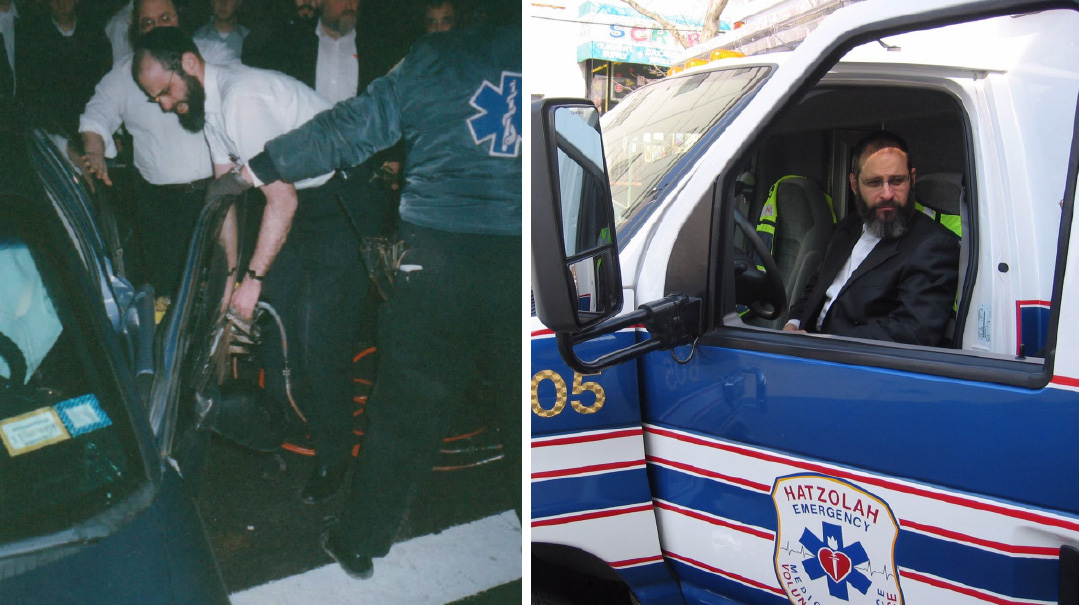
A
rmed with two phones and the ability to juggle multiple cases in a day, cool, collected Yankie Meyer made the impossible look easy, and few people, if any, ever saw him ever taking a break. But the camera doesn’t lie, and there is one picture of Yankie taking a quick break. It was in 2019, the day of his daughter’s wedding, and he’d been up the entire night before coordinating the logistics for the Skulener Rebbe’s levayah, which drew a crowd numbering in the tens of thousands. Yankie took advantage of a quick moment to catch a few minutes of sleep before the guests arrived. The photo shows him dressed in a black suit and hat stretched out with his feet up on a chair — a rare photo of the guy who never slept — actually closing his eyes.
In Yankie Meyer’s world, there was no such thing as good enough. He was constantly trying to figure out new ways to make someone else’s day better or easier. When it came to himself, however, he took a vastly different view. In fact, it wasn’t until last week that I and most of the media discovered that we had consistently spelled his name wrong. He never once corrected me, and why would he? In his mind, the focus was never on him, but always on what he could do for someone else.
Yankie made no secret of his gratitude to tblc’t his wife Gittel, publicly acknowledging that none of what he accomplished would be possible without her. He extended the same gratitude to the wives of his volunteers at every Misaskim event, arranging special women’s programming and gifts when Misaskim held a Shabbos of appreciation for its active volunteers.
But the depths of Yankie’s massive heart became even more abundantly clear with the launch of Project Yedid, founded to continue providing support to almanos and yesomim long after the shivah ended. A year-round effort and the largest item in Misaskim’s annual budget, Project Yedid hosts Chol Hamoed outings for hundreds of kids, makes deliveries of Yom Tov gifts, and even sends kids to summer camp. One of his favorite projects was what he would call “gebentshte gelt,” Chanukah gelt for yesomim — dollar-bills bearing brachos from gedolim in Eretz Yisrael. Yankie would take the dollars to Eretz Yisrael every year, an effort that involved making the proper arrangements with customs in New York so that he could clear security with $30,000 in cash.
One year, Yankie told Rav Gamliel Rabinowitz that he was concerned that he might get stopped by Israeli customs agents on his way home, and Rav Gamliel handed him a single aravah, instructing Yankie to place it in his bag, and telling him, “They’re not going to see it.”
Yankie was pulled over by security in Ben-Gurion as he prepared to fly back home and was asked to empty his pockets, but his bag passed through security without a second glance, just as Rav Gamliel had promised.
The consummate planner, Yankie had already begun planning this year’s Simchas Beis Hashoeivah for Project Yedid. Singer Yumi Lowy recalled the pre-Rosh Hashanah texts he would often receive from Yankie asking him to sing at his Chol Hamoed Succos event and how Yankie would leave compliments on his WhatsApp status, thanking him for brightening Yom Tov for Project Yedid’s kids. A WhatsApp voice note shared by singer Joey Newcomb featured an exuberant Yankie showering him with brachos for agreeing to perform at this year’s event, telling Newcomb that he would be making “hundreds and hundreds of yesomim happy.”
Jewish music superstar Avraham Fried always knew that his good friend Yankie Meyer’s number appearing on his phone’s screen meant another great mitzvah opportunity. And last year, Yankie was on hand to repay the favor, when Fried was performing at a Chanukah concert in Boro Park immediately before a scheduled flight from JFK to Tel Aviv.
“I knew it was going to be a tight ride,” Fried relates. “When I finished the concert and rushed outside to catch my Uber, someone says to me, ‘Forget the Uber, Yankie Meyer is taking you to the airport.’ We got there with time to spare.”
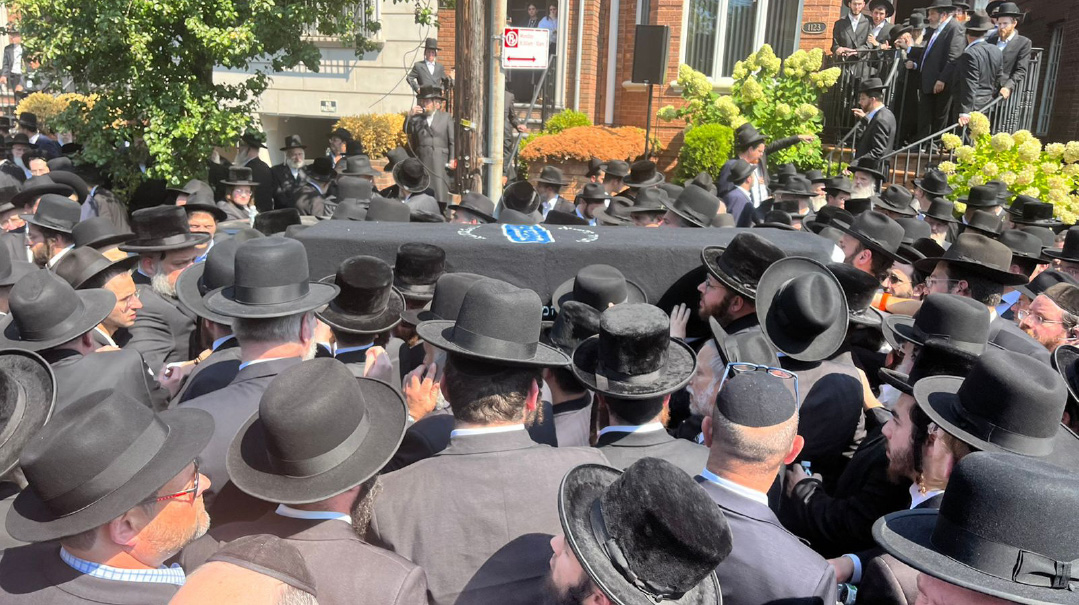
A stunned crowd at the levayah for the friend who was larger than life. “This isn’t Acharei Mos Kedoshim Emor. This is real. Yankie Meyer was real”
Y
ankie spoke with Rabbi Yehiel Kalish, CEO of Chevra Hatzalah, several months ago about the importance of developing relationships and appreciating that there comes a time in every organization to turn the reins over to someone else. In retrospect, Kalish said that Yankie obviously knew that his situation was extremely serious and the idea that he was planning ahead and taking care of issues that others might have been reluctant to touch or fearful of contemplating was something that Yankie often did.
“He wasn’t scared of anything. He lived by the concept of lo saguru mipnei ish — there wasn’t a man on this world that he feared,” says Kalish. “He only feared Hashem and everything he did was l’sheim Shamayim.”
Word began slipping out this summer that Yankie wasn’t well, and he traveled to Eretz Yisrael shortly before his passing to meet with gedolim and to get their brachos, telling Avraham Fried in advance of his trip. He explained that the visit was to be a short one — just a day or two — because he wanted to get back for his brother’s wedding.
“It took me a second to realize he was talking about me,” shares Fried, whose son married recently. “As he was flying back, he told me that he was ‘overweight with brachos and yeshuos.’ ”
Despite his good intentions, Yankie wasn’t able to attend the Fried wedding. He sent his regrets in a text saying, “Avremel, I really tried, but the last few days haven’t been easy. That’s Hashem’s plan.”
Yitzy Jablon paid a visit to Yankie on the day that he was admitted to Maimonides Medical Center, bringing one of his detectives along for the trip.
“I had a chance to speak to him,” says Jablon. “He said, ‘Der Eibeshter firt de velt — gotta daven.’ Then he fist-pumped me and my detective, telling us both that all would be good.”
Yankie’s passing last Friday morning had a ripple effect that resonated far beyond the Jewish community.
“We’re all here to do good in the world,” observes retired NYPD chief Joseph Fox. “Life is about to what extent we align ourselves with that mission. Jack Meyer lived every moment of his life perfectly in alignment with that mission, and our world, and all of those he touched — me included — are better people because of him.”
“Things were very solemn at the NYPD,” adds Jablon. “People were very upset — they lost a friend. They lost a brother. They lost somebody they knew they could count on. They knew there was someone in the community who was truly and wholeheartedly there for the department and the community.”
Local elected officials, Mayor Eric Adams and Brooklyn District Attorney Eric Gonzalez were among the many who paid homage to Yankie Meyer on Twitter, with Attorney General Letitia James tweeting, “My heart is with New York’s Jewish community after the tragic loss of Reb Yankie ‘Jack’ Meyer. He spent his life serving others, and his legacy will live on. May his memory be a blessing.”
“This isn’t Acharei Mos Kedoshim Emor,” says Kalish, referring to the popular joke listing the three consecutive parshiyos in Sefer Vayikra to describe how everyone is suddenly described as a tzaddik after their deaths. “This is real. Yankie Meyer was real.”
Looking ahead, Misaskim is working hard to perpetuate Yankie’s legacy. Cremations and autopsies will still need to be stopped, shivah houses will still need to be stocked, and almanos and yesomim are still eagerly awaiting the next burst of sunshine in their lives, despite the loss of the man who lived to make them smile.
“We are working very hard to get all this done and to keep everything going the way it was,” says Misaskim’s Meir Weil. “We are never going to be able to live in Yankie’s shoes, but we’re doing our best to fill his footsteps.”
Why Compound Their Pain?
By Ratzi Graus
Mrs. Malkie Klaristenfeld founded the Knafayim organization to help couples through the wrenching pain of stillbirth. Yankie Meyer was a steady partner in her efforts.
“We at Knafayim provide emotional and physical support, but when it came to the technical details — dealing with the medical examiner, medical facilities, and burial details — Reb Yankie was always there to intercede,” she says.
Over 20 years ago, Yankie purchased a burial plot for stillborn babies. He recognized the tremendous pain, expense, and bureaucratic red tape involved in the burial of these precious neshamos and wanted to spare parents at least that added measure of heartbreak.
“His voice still reverberates in my ear,” Malkie says. “ ‘Klaristenfeld, come over, I need you here!’ And of course, I came.”
With his ever-crisp white shirt and ready-to-roll demeanor, he was always alert and ready — even at 3 a.m., when Malkie once got a call: “Klaristenfeld, I’m outside your house. I need you to accompany me to a home with a SIDS crisis.”
“I’ll never forget that incident,” she says. “The shocked and heartbroken parents were being questioned by authorities, while Reb Yankie was handling the medical examiner and legalities. At one point, Reb Yankie picked up a broom and started sweeping the house. I asked him, ‘What’s going on?’ And he taught me an important life lesson.
“ ‘You can’t get lost in the tragedy,’ he said. ‘We must be present and face reality. ACS (New York’s Child Services) will soon be summoned to the home and chas v’shalom if they see an unswept floor… can we risk compounding the trouble of these grieving parents?’”
And so this commander-in-chief of a chesed battalion continued sweeping until the house looked perfect.
Reb Yankie wasn’t just a boots-on-the-ground presence, he was also a behind-the-scenes connector, smoothing the way through bureaucracy at times when grief made logistic challenges seem not just daunting, but impossible.
“Reb Yankie was on our speed dial,” says Mr. Yidel Roth, Knafayim’s burial director. “He connected us with the who’s-who in our local, city, and other state medical facilities. If we couldn’t come through the front door, Reb Yankie got us in through the back door. There were times when I had to contact him three or four times a week to arrange burials. He was always available.”
This past Hoshana Rabbah, Knafayim accompanied a couple facing a stillbirth delivery after years waiting for a child. The pain was tremendous, and the tight timing of the impending Yom Tov made the situation even harder to navigate.
“How could this couple cope with leaving the hospital while their dead baby was still inside? So, I called Reb Yankie,” recounts Mr. Roth. “He hastily arranged for the body to be seen by the medical examiner, filled out all the hospital forms, and ensured that Mrs. Klaristenfeld carried the baby out of the hospital 15 minutes before the zeman. She then gave it over to Misaskim volunteers to handle the rest.”
“One Erev Pesach,” Malkie remembers, “we were both tending to a loss at the hospital. I stayed to support the couple while Reb Yankie was handling the technical and legal aspects. An hour before the zeman, Rabbi Meyer told me: ‘Mrs. Klaristenfeld, you must go home to your family.’ And I replied, ‘So do you!’ ”
“You’re a mother, and your family needs you. So I’ll stay,” commanded Reb Yankie.
Over the years, Malkie and her team learned to trust Reb Yankie implicitly. “If I ever doubted his instincts, he would tell me, ‘Klaristenfeld, I know what I’m doing!’ And time after time, he was proven right.”
Thousands turned up for his levayah on Friday, to show gratitude and respect for the man who dropped everything for Jews facing the worst pain of all. They may not have seen it, but the crowds below were surely paralleled by crowds above. You could almost sense the welcome his neshamah received as it was greeted by all those holy souls he’d sent off to their resting places in Gan Eden with the compassion, dignity, and discretion that had become synonymous with his name.
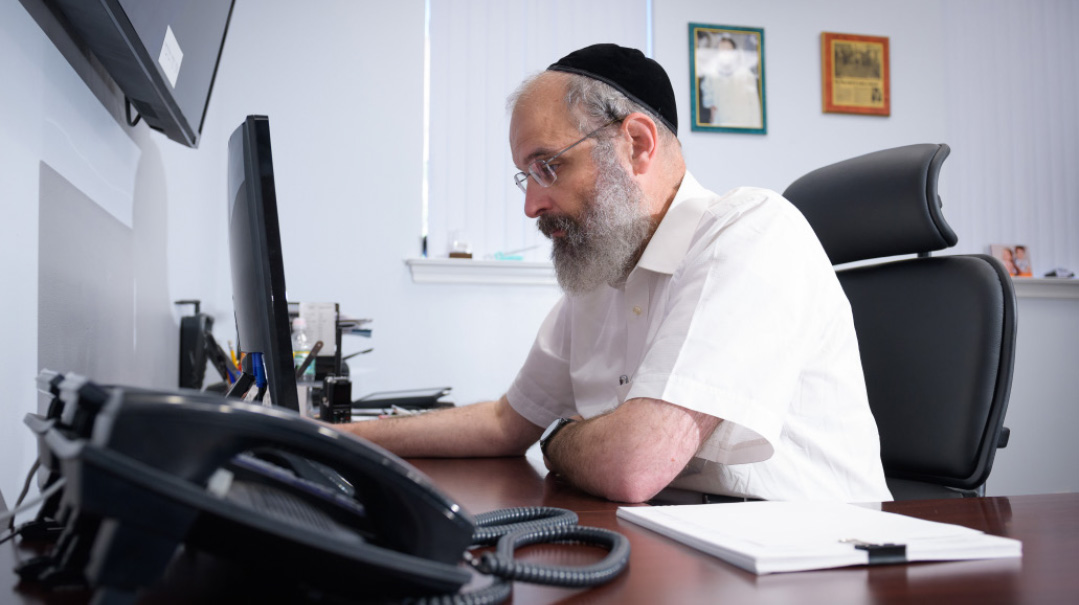
Never Go Numb
Sarah Rivkah Kohn
Dear Reb Yankie,
I know you would have my head for writing a tribute, but really, it’s all your doing. Because when a public figure passed away very suddenly a few years back, you called me for the phone number of a rav who’d been close with him. “Maybe this guy didn’t like kavod but his family deserves to hear about the chesed he did — maybe it’ll bring them nechamah,” you said.
So, I’m just following your instructions.
We both started organizations around the same time for children who lost a parent. Your experiences through Misaskim had shown you what children sitting shivah go through in the long run, so you opened your Project Yedid V’Yedid division. And I started Links. It was you who introduced most of our families to us — our database is full of “Misaskim sent 2016; Misaskim sent 2020…”
Over the years, we had our fair share of disagreements — usually about your unusually generous giving. Like the time you mentioned you’d been in a shivah house and noticed the oven wasn’t working… so you bought the almanah a new one. Then, you said that a week later the fridge broke and they called you to get a new one. Of course, you had it delivered that afternoon and also helped the family transfer all the food into the new fridge.
I protested. “Rabbi Meyer, soon it’ll be a freezer and a dishwasher!”
And you answered, “Nu… so maybe I’ll have the zechus to buy those too.”
I pushed back. “You’re not an appliance store. You’re allowed to say you don’t do this.”
You countered strongly, “I wasn’t born to know how to say no to an almanah or yesomim.”
And that was how all our “fights” ended. There was no way to budge you.
(As I predicted, you bought them a new freezer just a few weeks later. The dishwasher, I’ll never know.)
Several years ago, you began hosting the most amazing Simchas Beis Hashoeivah for children who lost a parent. One Isru Chag, you called me with a request: “Mrs. Kohn, please get me the kids’ complaints and criticism. Tell me everything — it’s the only way we can improve.”
I told you everything was wonderful and you should stop looking for criticism where there was none.
“Listen, they’re not going to tell me, because I run it. Please, if you ever hear a complaint, tell me.”
A couple of years later, a few girls mentioned that the activities that year had been mostly geared to younger kids and there hadn’t been much for their age.
I hesitated to tell you. We all know it’s impossible to satisfy five-year-olds and 15-year-olds in the same way. But I’d promised, so I called you.
You were all business: “You know, it makes sense. I have an idea for how we can do it differently.” And you did.
During Covid, I was working with hundreds of families, and I didn’t know how to carry it all. I called you to hear how you were doing all this work. It was one of the only times I heard you broken. You knew what people wanted and you also knew it wasn’t possible. You told me it was crushing. It was a short conversation, with you stopping to take tens of calls (literally) in a span of a few minutes. You had the trust of the medical examiner and the health department, every mosad and every family with a patient and every family sitting shivah. Everyone needed a slice of you.
Reb Yankie, you never shared what you did for people. You didn’t share that this widow called you when her snow needed shoveling, or that you arranged for that family to have a normal bar mitzvah a few days after shivah, or the many families you checked in with regularly to find out what more you could do for them.
You davened that it should always hurt. You told me you never wanted your work to numb you to feeling the pain of others. “I may have seen thousands of shivah homes,” you said, “but this is theirs.”
More than most people, you knew the tzaros in Am Yisrael. You knew how much Klal Yisrael needs a surge in tefillos and yeshuos. You knew how much we need the Geulah.
Rabbi Meyer, if there’s anyone who can do it, it’s you.
Sarah Rivkah Kohn is founder of Links, a support system for children and teens who have lost one or both parents, connecting them with peers and mentors who have been through the same experience.
(Originally featured in Mishpacha, Issue 928)
Oops! We could not locate your form.





